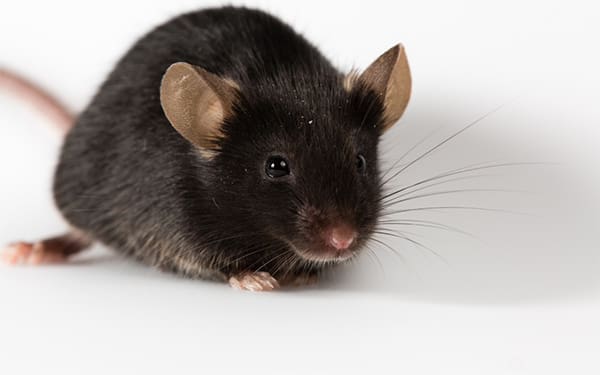Rag1-KO
Rag1-KO
| Strain details | |
|---|---|
| Nomenclature | B6.SVJ129-Rag1tm1Bal/Ozarc |
| Common name | Rag1-KO |
| Synonyms | Black N10, RAG1 N10, RAG KO, Rag1 -/- |
| Strain | Mutant inbred |
| Coat Colour | Black |
| Species | Mouse |
| Genetic background | C57BL/N10 |
| Location | Area Oz1 |
Strain descriptions
- MCH haplotype: H2K b
- Complement factor: C5 normal
- Rag1-deficient (Rag1-/-) mice are an immunodeficient stock strain that lack functional B and T lymphocytes.
- Rag1 (recombination activation gene) is one of two activation genes for V(D)J recombination which occurs at seven unique loci including loci in mature B and T lymphocytes.
- Mice that are homozygous for the Ragtm1Bal mutation express a non-leaky severe combined immune deficiency phenotype (Prkdcscid/Prkdcscid) and contain 15–130 times fewer cells in the thymus.
- Thymocytes of Rag1-/- mice are larger than the heterozygous and wildtype equivalents and produce no CD3+ or T-cell receptor ab-positive (TCRab+) cells.
- Homozygous Rag-1 deficient mice appear healthy and are indistinguishable from heterozygous and wildtype littermates despite being immunodeficient.
- Both male and female homozygous mice are fertile and produce viable offspring.
- Old mice can develop inclusion body nephropathy.
- In order to accommodate their level of immunodeficiency, Rag1-deficient mice are maintained at Ozgene ARC in a maximum barrier environment, housed within individually ventilated cages (IVC).
- Strain of Origin is 129S4/SvJae then backcrossed on C57BL/6J to N10 at ARC.
- This stock strain is highly applicable to a range of autoimmune research fields.
Past ARC and transfer reports:
Current Ozgene ARC reports (from 01-Jun-2023)
- This strain is housed in Area Oz1
- Please see Oz1 health reports on our Biosecurity page
- Animals are not allowed to be used for propagation
- Ozgene ARC terms and Conditions
- Mouse images are representative only. Actual phenotypes may vary based on genotype, sex, age, husbandry, health status, and other factors.
- Spanopoulou E, Roman CA, Corcoran LM, Schlissel MS, Silver DP, Nemazee D, Nussenzweig MC, Shinton SA, Hardy RR, Baltimore D. Functional immunoglobulin transgenes guide ordered B-cell differentiation in Rag-1-deficient mice. Genes Dev. 1994 May 1;8(9):1030-42. doi: 10.1101/gad.8.9.1030. PMID: 7926785.


